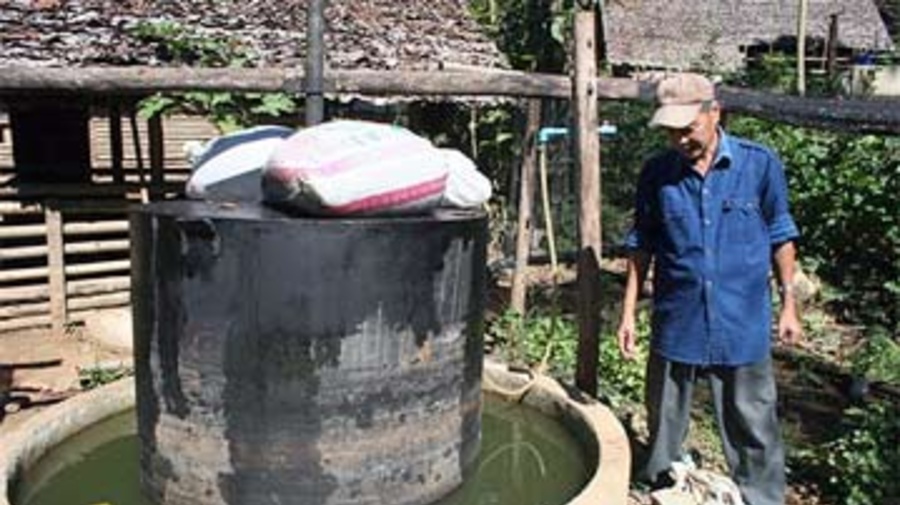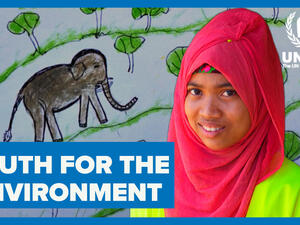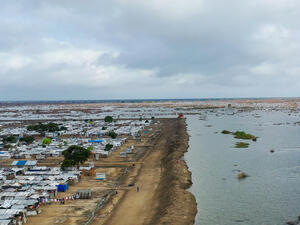Burmese innovator taps traditional knowledge to feed fellow refugees and protect the earth
Burmese innovator taps traditional knowledge to feed fellow refugees and protect the earth

Refugee David Saw Wah built his own biogas converter to make cooking gas from pig manure.
BAN MAE NAI SOI, Thailand, January 8 (UNHCR) - While the other 4,000 families in this refugee camp in north-west Thailand do their daily cooking over wasteful wood fires, David Saw Wah's family cooks two meals a day with gas piped into their kitchen.
More remarkable, this luxury is entirely the result of David's own ingenuity - his family cooks with biogas produced in a tank he made, using the manure from three pigs raised on a small plant-filled plot.
A few minutes in the enchanting garden of the enthusiastic 59-year-old refugee from Myanmar is all it takes to realise his brain is bursting with ideas to minimise the damage the 17,740 refugees in this camp do to the environment. There are container gardens slung from trees, vegetable crops to provide vital micro-nutrients, dense plantations of "living fences," trees to demarcate the refugees' plots while providing food. Then there's a small-scale hydropower project, a catfish farm, rabbit hutches, solar cookers and nitrogen-fixing trees surrounded by food crops in an innovative closed system.
"If we don't want to forget ourselves, we should dig the earth," he says by way of explaining his motivation and his philosophy. "We have to heal the soil. If everybody takes care of one square metre, the earth will be okay."
David's transformation into an organic farmer and environmental advocate began seven years ago when he was elected chairmen of four refugee camps for Karenni refugees. (A refugee since 1996, he came to Ban Mae Nai Soi three years ago.)
He saw his fellow refugees languishing in enforced idleness, since the Thai government does not allow refugees to work. Basic food is supplied by the Thailand-Burma Border Consortium (TBBC) of non-governmental organisations.
"If everything is provided, over time you get lazy. Whether you do something or not, you still get to eat," he says. He wanted to find something for refugees to do that was both labour intensive and would improve their nutrition.
A former mining and mechanical engineer who had worked at a tin and tungsten mine, David set about educating himself from Western scientific text books and traditional knowledge gleaned from Karenni elders.
"You can see me as a telephone operator - I just connect traditional knowledge with scientific knowledge," he says with a self-effacing smile. This conjunction produced a project to make energy-efficient stoveless cooking briquettes from leaves and charcoal. He's trained other refugees to make the briquettes, which also contain lemongrass to repel mosquitoes as they cook food.
Another project is improving women's health by encouraging the planting of drumstick plants, whose pods and leaves are rich in calcium and protein.
On the hillsides of this mountain settlement, David runs his own experimental farm and demonstration garden - dashing from project to project to show off his organic plants. "I've planted more than 3,000 trees," he says. "On a 50-metre plot you can grow 350 trees; that's firewood for one family for a year."
His projects are a showpiece of refugee ingenuity - and David has prepared a PowerPoint presentation to introduce his vision to high-level camp visitors. Unfortunately, his fellow refugees have not tried to emulate his example.
"They want money," he says. "If you go to a Thai village, you can earn 50 baht [US$1.40] a day, but with 50 baht you cannot supply all the nutrition for your family." David argues that the same labour invested cultivating a small plot could easily feed a family.
But he's encouraged that back home his fellow minority Karenni - many of whom are in hiding in the jungles of eastern Myanmar because of persecution by the military government - are adopting his ideas.
One of the most popular is what David jokingly calls the "guerrilla garden" - basket containers hidden in the crook of tree branches to grow beans, pumpkins and cucumbers, out of reach of animals. At the base of the tree, taro and sweet potatoes can grow in the shade. Blending into the landscape, these guerrilla gardens don't betray to the Burmese army where the Karenni have settled.
In the camp, he wants to be sure Karenni refugee children do not forget their rural roots. "We have to bring our children close to nature," says David, father of four children, ages 13 to 25. "Children must remember they are under the laws of nature. Children here have forgotten where food comes from - they say it comes from the TBBC."
And he's determined to share his knowledge. David's putting the finishing touches on a handbook he plans to distribute free - in the English, Burmese, Karenni and Shan languages - to propagate his ideas.
"These ideas are from everywhere and this is for everybody," he says, brushing away any suggestion that he could profit from his well-illustrated, practical book. "As long as I am here, I must be able to contribute to my community."
By Kitty McKinsey in Ban Mae Nai Soi, Thailand









